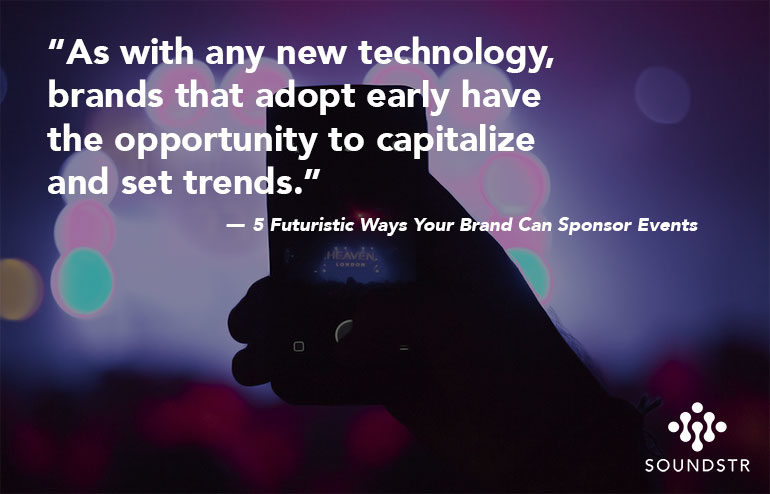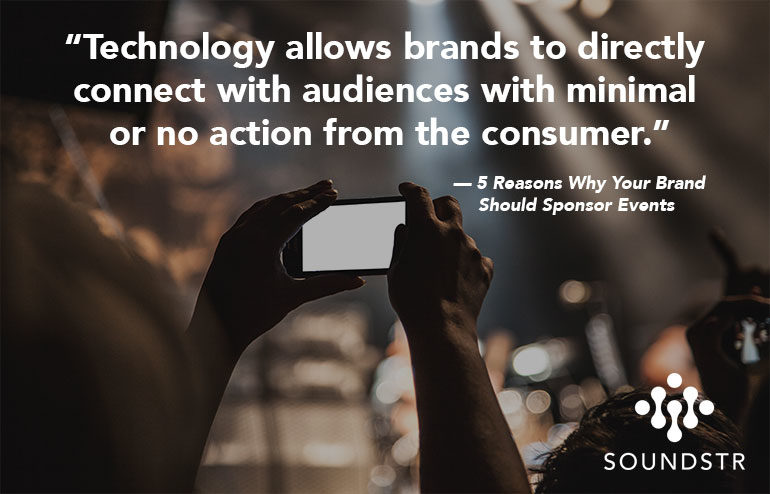In today’s digital age, you may have to do more than hang a banner to captivate audiences at an event.
Smartphones and social media are killing our attention spans. In a study conducted by Microsoft between 2000 and 2015, our ability to focus has dropped from 15 seconds down to a pitiful 8 seconds. Eight seconds is one less than that of a goldfish. So your carnival pet might be able to win at a staring contest.
There is a simple equation that needs mentioning. When it comes to conversion rates, engagement > visibility.
Consumers are smart and don’t want a brand selling to them. Visibility and name recognition only go so far. Banners, backdrops and signage aren’t stimulating. Advertising should include a call to action from the consumer, but only if the cause of action is enticing enough for them to want or need.
Creating demand with an offer or experience is the name of the game. But the presentation and effort required plays an important role in the user uptake. A great offer with an uninteresting method of connecting the user with the experience can leave a campaign dead in the water. Technology also replaces yesterday’s human touch through efficiency. No more filling out registrations or sign-up sheets required, which minimizes time and effort.
Below are 5 unique ways to advertise at live music events. Each example is efficient, user-friendly and often drive high levels of engagement.
1. Text Campaigns
Short-code text campaigns are great. Texting a unique word to a short number (often 5-6 digits) will return a confirmation code or discount to the user. Text campaigns gained popularity in the late 2000’s on the television show “American Idol.” They have become a familiar tool to consumers of all demographics. For advertisers, this medium collects a list of phone numbers that you can add to auto text campaigns. Having this direct pipeline to the consumer is invaluable as social media evolves and audiences shift to the newest, coolest platform.
2. In-Venue Broadcast Ads
Broadcasting advertisements in venues is a new way to drive engagement. Fans hear radio-style ads over the sound system during set changeovers, and before/after concerts. This time is often dedicated to playing house music, so it’s a great time to present an event sponsor. In-venue ads are cheaper than radio or cinema advertising. They also focus on engagement over visibility, which often leads to a higher conversion rate. These ads require a device for playback and verification, but more venues are utilizing this technology.
3. Beacon Technology
This is the fine line in the sand where the costs and opportunity increase. Beacon technology, known as Bluetooth Low Energy (BLE), interacts with consumers’ smartphones. If someone has an app on their phone and walks within range of a Beacon, they could receive an automatic push notification. (Note: The phone’s Bluetooth needs to be active and the audience needs to have the app using the Beacon.) In other words, there is no action required by the user to get the notification. Businesses that have apps can easily incorporate beacons into ad campaigns. No worries if your business does not have an app, as you have options. App building software and developers have become cheaper and more accessible in recent years. Advertisers also have the option of using popular third-party apps for beacon-enable campaigns. These include artist, venue, or reward apps, among others. After you have identified your destination app, align with a medium that offers beacon marketing and the rest is easy.
4. RFID Chips
RFID (radio frequency identification) has become more popular at events, especially music festivals. Through the use of RFID chips and readers, attendees can have a seamless concert experience. RFID allows for checking in and out of access points, push notifications (via app), and even make purchases. PromoWest Productions just introduced RFID technology the Bunbury Music Festival music festival in Cincinnati in June 2016. This led to several improvements from past festivals. By using RFID over cash/credit, all point-of-sale transactions happened via wristband scan. Attendees could load cards at pre-designated “Top Off” stations or through the festival’s app. Fast-paced lines and meant less time missing performances and happy attendees. With this tech making its way into more spaces like marathons, RFID may become cheaper and more accessible over time.
5. Augmented & Virtual Reality
Augmented and virtual reality may sound like the future, but in some cases are already available. These sponsorships and activations need third-party technology for broadcasting and viewing. But there are some cost effective workarounds, like 3D technology. Using a 3D projector, audiences can view imagery broadcast with basic 3D glasses. This can be an inexpensive way to display unique visuals at any live event. On the reverse, there are also scenarios that might cost a pretty penny. If you plan on projecting an image of Tupac, you will pay for everything from equipment to license fees. As more advertisers and marketers enter the space, the supply and demand will make this area less expensive.
It’s hard to believe that these advertising methods are already available. A brand’s ability to interact with the consumer is better than ever, and who knows what the future will hold. As with any new technology, brands that adopt early have the opportunity to capitalize and set trends. The only question is, will you be ahead of the curve?
Interested in learning more about how your brand can explore these advertising opportunities? Click below for a FREE consultation.




